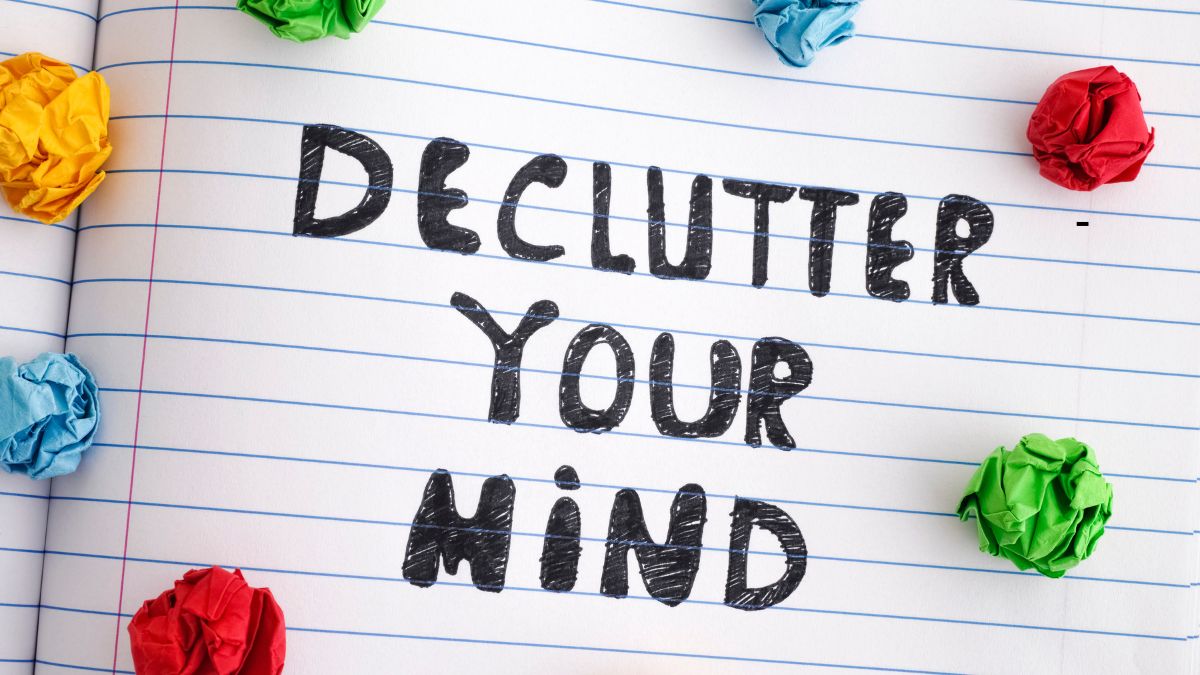I don’t know about you, but there have been times in my life when my head felt like an overstuffed closet—crammed with thoughts, worries, memories, to-do lists, and emotions, all stacked up with no breathing space. When my brain feels that cluttered, I can’t concentrate, I become anxious, and even the simplest choices seem monumental.
If you’re reading this and have ever felt the same way, you’re not alone. We all deal with clutter of one kind or another—whether it’s work-related stress, relationship struggles, money problems, or just the endless noise of everyday living.
And just as physical clutter leaves your home feeling chaotic, a cluttered mind leaves your inner life feeling heavy, foggy, and unsettled.
The good news? Just like cleaning up a messy room, clearing your mind is a step-by-step process that requires the right tools and methods.
I’ll walk you through proven action steps to reduce mental clutter, quiet your thoughts, and create space for more peace, focus, and creativity.
What Does Clearing Your Mind Mean?
Clearing your mind doesn’t mean eliminating every thought or shutting down your emotions. It means creating space so you’re not weighed down by constant noise and negativity. Think of it as:
-
Releasing unnecessary anxiety.
-
Organizing your thoughts.
-
Letting go of what you can’t control.
-
Making room for clarity and calm.
When you clear out mental clutter, stress decreases, sleep improves, focus sharpens, and life feels lighter.

Why Decluttering Your Mind Is More Important Than Ever
We live in an age of constant stimulation. Every day, our minds are bombarded with:
-
Notifications and emails.
-
Social media updates.
-
News headlines and opinions.
-
Endless to-do lists.
This constant input leaves little room for stillness. No wonder so many people feel overwhelmed, anxious, or stuck in overthinking loops.
Minimalism isn’t just self-care anymore—in today’s world, it’s survival. The ability to reclaim control over your thoughts instead of being ruled by them is a skill worth cultivating.
12 Effective Ways To Clear Your Mind
Now let’s get down to the real work. Here are evidence-based and experience-driven ideas you can use to start creating mental clarity today.
1. Brain Dump Everything on Paper
One of my favorite strategies is to do a brain dump. Get a notebook and write down everything on your mind—tasks, worries, ideas, memories, frustrations, or even something as simple as “buy batteries” or “call mom.”
Once it’s on paper, you don’t have to hold on to it mentally anymore. You’ll feel instant relief because the weight has moved from your head to a place you can revisit later.
2. Prioritize Ruthlessly
After completing your brain dump, look at the list and ask yourself:
-
What is truly important right now?
-
What can I delegate or delay?
-
What can I completely let go of?
Mental clutter often comes from treating everything as equally urgent. Learn to prioritize so your mind isn’t pulled in ten different directions.
Related; How to Declutter Your Home Room by Room
3. Limit Digital Noise
The digital world is one of the biggest sources of mental clutter. Try:
-
Turning off non-essential notifications.
-
Setting “screen-free hours.”
-
Cleaning up your social feeds—unfollow accounts that drain your energy.
-
Using apps that block distractions during focus time.
When you turn down the digital noise, your brain has more space to process its own thoughts.
4. Practice Mental Minimalism
Just as you don’t need a thousand items in your home, you don’t need a thousand thoughts in your head.
Ask yourself: Is this thought helpful? Does it serve me right now? If not, let it go. Mental minimalism means holding on only to thoughts and beliefs that truly serve you.
Related: How To Change Your Mindset: 5 Formulas For Resetting Mindset
5. Let Go of What You Can’t Control
A lot of mental clutter comes from trying to solve problems we have no power over—like someone else’s choices, the economy, or the past.
An effective practice is to acknowledge what you can’t control and consciously release it. Journaling, prayer, or meditation can help with this process.
6. Create Mental Routines
Routines organize your mind. When your brain knows what to expect, it spends less energy on constant decision-making.
Try:
-
Morning rituals (journaling, stretching, gratitude).
-
Evening wind-downs (reading, tea, no screens before bed).
-
Weekly planning sessions.
These rhythms prevent clutter from piling up.
7. Move Your Body to Clear Your Mind
Exercise isn’t just good for your body—it’s a reset for your brain. Movement helps release tension, regulate emotions, and sharpen focus.
Even a 10-minute walk outside can get your thoughts unstuck when your mind feels stuck on repeat.
Related; 10 Powerful Strategies to Master Your Mind
8. Simplify Your Commitments
Overcommitment is one of the quickest ways to clutter your mind. Learn to say no without guilt.
Remember: Every time you say yes to something unnecessary, you say no to your peace of mind. Simplifying your schedule lightens your mental load.
9. Practice Mindful Breathing
If your thoughts are spinning, return to your breath. A simple technique like box breathing—inhale 4, hold 4, exhale 4, hold 4—calms the nervous system.
Breathing grounds you in the present moment and resets your mind.
10. Declutter Your Physical Space
Your environment and your mind are deeply connected. A messy room or desk adds to mental chaos.
Take time to clean and organize your surroundings. The clearer your external space, the lighter your internal space will feel.
11. Talk It Out
Sometimes your brain just needs a release valve. Talking to a trusted friend, therapist, or even recording a voice note for yourself can help unload mental weight.
When you put tangled thoughts into words, they often become clearer.
12. Protect Your Mental Energy
Think of your mind as a storage space with limited capacity. Be intentional about what you allow in.
-
Avoid toxic conversations.
-
Limit gossip and negativity.
-
Choose uplifting content and relationships.
When you protect your energy, you prevent clutter from building up in the first place.
How To Keep Your Mind Clear Long-Term
Decluttering your mind isn’t a one-time task—it’s a lifelong habit. Just as your home needs regular cleaning, your mind needs consistent care.
Here’s how to maintain it:
-
Schedule a weekly “mental reset” (journaling, reflection, meditation).
-
Practice gratitude daily to shift focus from stress to positivity.
-
Set healthy boundaries with technology and people.
-
Create small routines that keep your mind organized, like nightly to-do lists.
The Benefits of a Clear Mind
When you commit to clearing your mind, you’ll notice powerful changes:
-
Improved focus – You can concentrate without constant distractions.
-
Reduced anxiety – A calmer mind helps you handle stress better.
-
Stronger creativity – New ideas flow more freely in an uncluttered mind.
-
Better sleep – With fewer racing thoughts, you sleep more peacefully.
-
More joy – A clear mind allows you to appreciate life’s simple pleasures.
Final Thoughts
Perfection isn’t the goal—progress is. Each small step you take to quiet the noise inside creates room for clarity, focus, and peace.
In my own life, I’ve found that when I take time to brain dump, prioritize, and breathe deeply, I feel more in control of my thoughts and less trapped by them. The more consistent I am, the lighter and freer I feel.
If the attic of your mind feels messy right now, don’t worry—you don’t have to unpack it all at once. Start small. Pick one practice from this list and try it today. Your future self will thank you for the space and peace you’ve created.
Save the pin for later

- 10 Valentine’s Day Basket Ideas - 09/02/2026
- How To Exit Your Lazy Girl Era - 08/02/2026
- 65 Truth or Dare Questions for Adults - 08/02/2026
